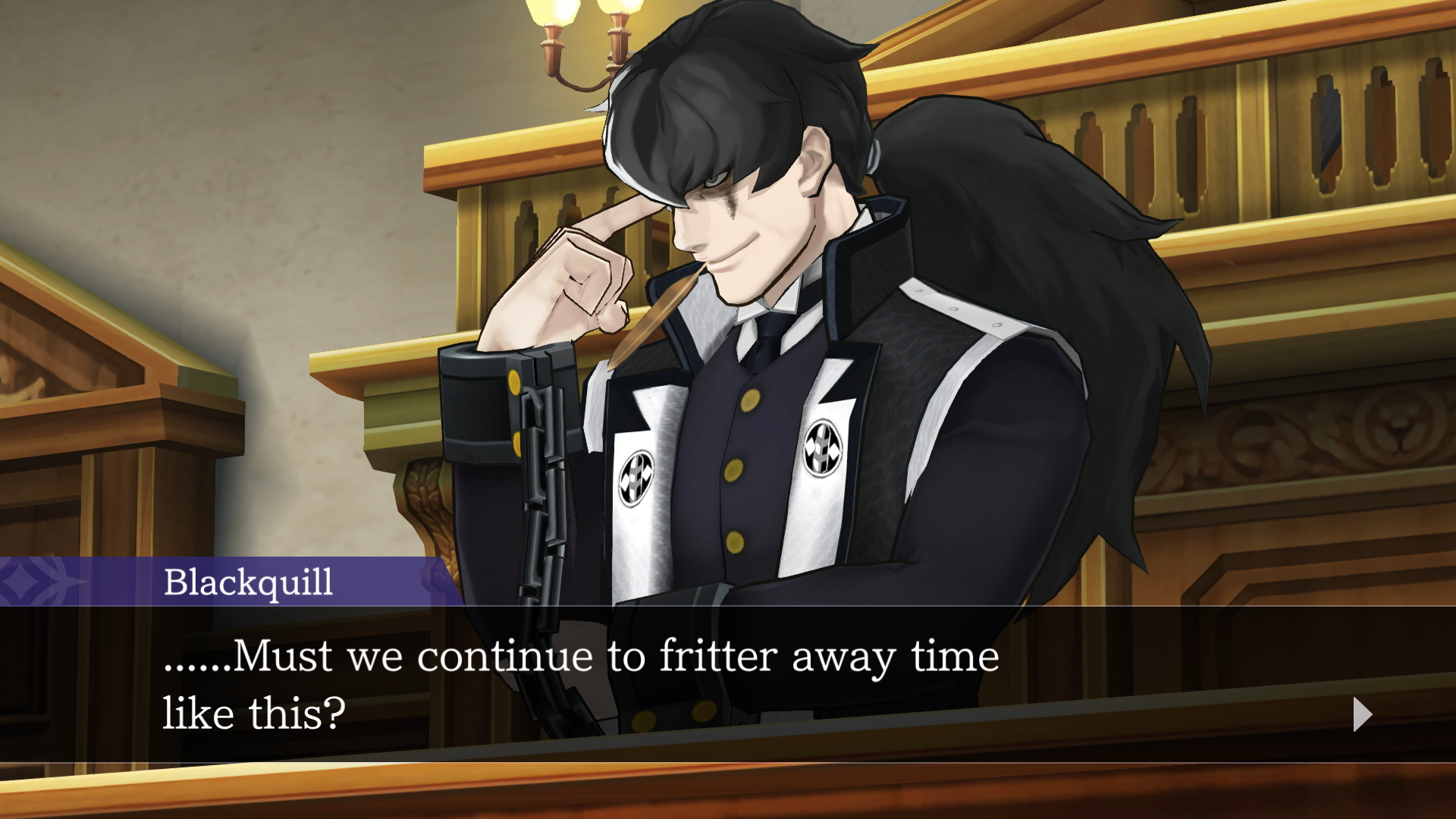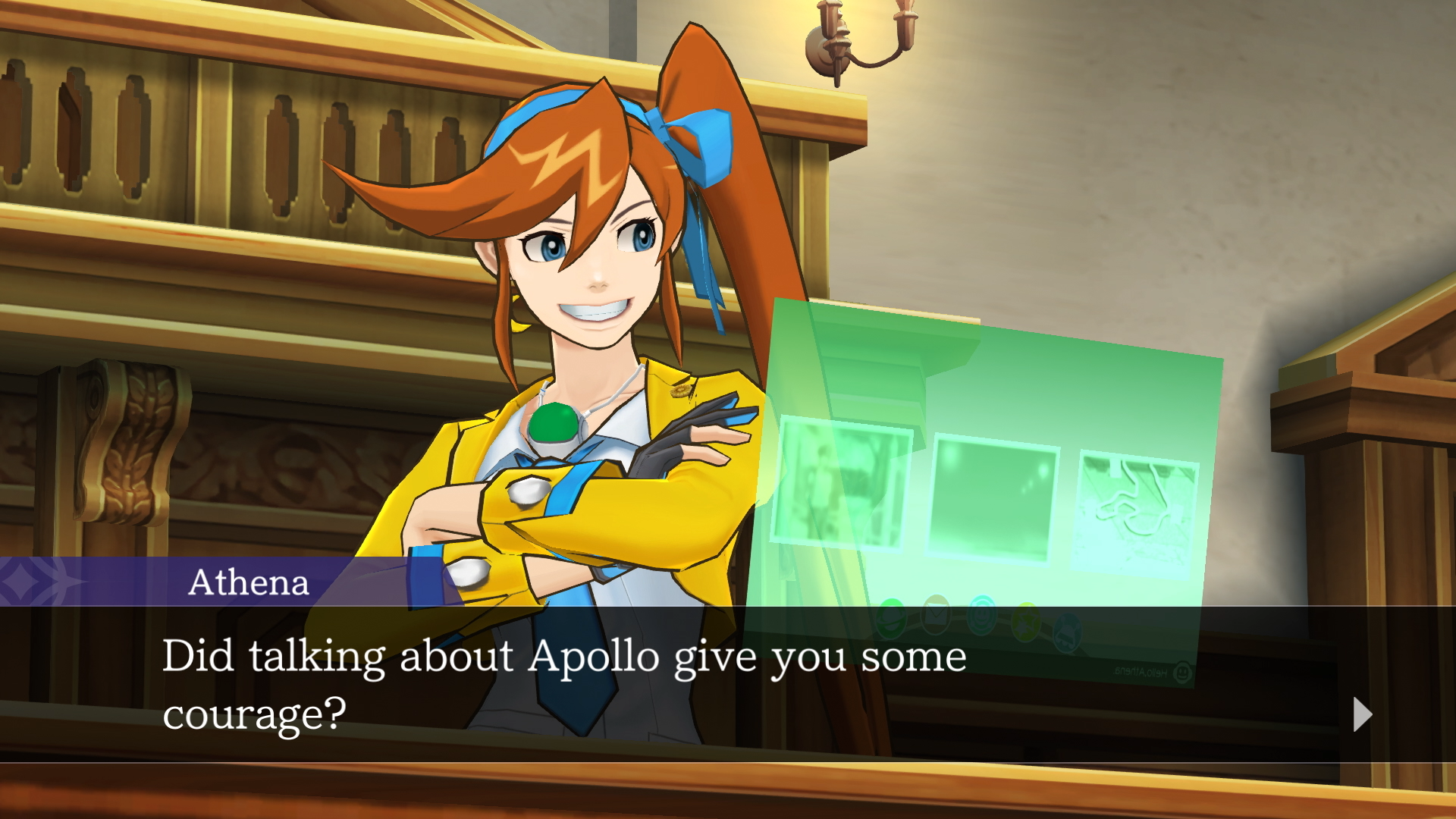Phoenix Wright has been a Capcom staple since the early 2000s. The Ace Attorney series has spawned a whopping 13 games(including re-releases and compilations), an anime series, a live action movie, and a truly terrifying amount of unofficial fan service. Now Apollo Justice and Phoenix Wright are back in a new collection that makes nearly the entire series available on Switch, excluding Miles Edgeworth Investigations and Professor Layton Vs. Phoenix Wright. Capcom has recently stated that the Ace Attorney series is not finished however, so those titles may come someday.

Apollo Justice: Ace Attorney Trilogy combines three separate releases into a single game. The first, Apollo Justice: Ace Attorney was originally released on the DS. Of the three, it’s the only one with a previous physical release before this collection. New to a North American physical release are Phoenix Wright: Ace Attorney – Dual Destinies and Phoenix Wright: Ace Attorney – Spirit of Justice. Both games were previously available exclusively as digital downloads from the 3DS eShop. With the eShop closing last year, there was a very real risk of these games being lost for official release. Some of us may have bought them on the eShop just in case…you know, for preservation.

Thankfully, Capcom recognizes that the demand for the Phoenix Wright series is extremely high and both 3DS games are included on Apollo Justice: Ace Attorney Collection. Yes, that’s weird because both of the 3DS games bear Phoenix’s moniker but they also both include large sections of each attorney’s exploits and feature a ton of crossover storyline. Longtime players will recognize that the entire series follows a timeline which refers back to previous entries in the series and builds on existing lore in a way that few series manage for over 20 years. Capcom also included nearly all of the DLC for both 3DS games in this collection, both the alternate outfits for various characters and the special episodes that had to be purchased separately (grrrr) on the 3DS eShop. There are even some surprises to be had with this excellent collection.

All three games follow variations on the classic Phoenix Wright formula. A crime is committed, someone innocent is put on trial, and Phoenix or Apollo being the good-hearted attorneys that they are, defend them. There are investigations where you’ll find clues that lead you to the true culprit and court battles where you’ll have to challenge the prosecution’s assertions in order to clear your client’s name. Paying attention to details is key in both the evidence you find and the courtroom drama. These are essentially linear visual novels however and things can’t shift fluidly like standard visual novels. Because you have a high degree of interactions, they aren’t true linear novels but there is only one way to effectively progress and it requires finding and presenting evidence in the correct order. However, Capcom did also include a reader mode that lets you simply read the stories if that’s your thing and the game will perform all investigations and evidence presentations for you. The only caveat is that you don’t get the achievements built into the game.

Starting with Apollo Justice: Ace Attorney, the series shifted away from focusing on Phoenix Wright alone. Apollo takes some getting used to but he’s a solid character in his own right (pun intended) and he’s accompanied by Trucy Wright, Phoenix Wright’s daughter. This is shocking of course because we have no idea where Trucy came from or what’s going on at first. For those that don’t know, there’s no sense in spoiling things either but she’s an excellent supporting character to Apollo and their main antagonist is Klavier Gavin, prosecutor and lead singer for a rock band. Most of Apollo Justice: Ace Attorney follows the same basic style as earlier games. However, Apollo wears a bracelet that tightens when it senses someone on the stand is nervous, allowing him to pinpoint their lies and misdirections and nail in on the true culprit in each case. The game consists of four cases that you solve in order to both free your clients and learn what has happened to the great Phoenix Wright.

It’s time to take a small diversion before we tackle the other two games in the series because the Apollo Justice: Ace Attorney Trilogy has a few functions built in that might surprise you. Chief among these is the ability to start any case from any chapter and continue on from there as if it’s your save. The original releases of each of the Ace Attorney games required you to complete a case in order before moving on to the next. Each had only two save slots, making it difficult to save spam and if you got caught unable to find the discrepancies in testimony, you could end up stuck in a case for quite some time. This approach made sense because it forced players to absorb the chronological stories in order so that they slowly understood the whole Phoenix Wright universe as it was being built.

That’s no longer the case here and Capcom has rightly (yeah, it’s hard to stop) included functionality that allows you to select where you’d like to start in each case. Part of this is simple modernization but the larger idea is likely that the developers realized people might want to continue where they left off on older games in the series. If you were 2/3 of the way through Phoenix Wright: Dual Destinies, are you really going to want to play through all the hours of game you lost when upgrading to a Switch version of the same game? Probably not. This functional shift allows you to pick up where you left off, regardless of console and drop right back in to the game. Sure, some people will just skip to the end, but in a series like the Ace Attorney series, skipping ahead serves no purpose and leaves you confused as to the end result and overall storyline. Instead, this is a highly useful convenience and it’s awesome that it is included for all three games.

Now let’s get back to the game itself and look at Phoenix Wright: Ace Attorney – Dual Destinies. As you may have surmised from the title, Phoenix is back but Apollo Justice is still here as well. Phoenix has hired a new lawyer too, a young woman named Athena Cykes. Athena specializes in analytical psychology and is assisted by Widget, a computerized necklace that reads emotional states. Athena works with Apollo on the five main cases in Dual Destinies and Phoenix makes a special appearance in the sixth case which was originally DLC on the 3DS.

There are some noticeable changes from Apollo Justice: Ace Attorney, particularly the more advanced cinema sequences and the addition of 3D camera angles for different areas when investigating. Making sure to investigate every accessible area is vital to progressing, just as in previous entries. Fast forward is more effective now and you can speed up dialogue and you can finally view all previous dialogue in the game with the touch of a button. Transcripts were much needed in the earlier Phoenix Wright games due to the potential to miss key details. If you’re stuck, you can always consult for a hint now as well (though they’re rather opaque) and there’s a new Notes tab that gives you an idea of what to do next if you’re stuck. You’re still essentially playing a linear game but it’s remarkably easy to miss something subtle.

Finally we come to Phoenix Wright – Spirit of Justice. This is the most recent entry in the series, also previously only on 3DS digitally. Once again you’ll be playing two different sets of stories that dovetail together, one with Apollo and Athena and the other with Phoenix and Maya from the original Phoenix Wright: Ace Attorney game. Like before, there are five main episodes and a special episode included in this game and the gameplay is unchanged from the Dual Destinies model. The storyline is a bit more convoluted, building on what’s been going on in Dual Destinies and Phoenix’s experiences in the Kingdom of Kuhra’in, but it’s a gratifying experience as a whole and a great wrap-up to the trilogy. Oddly, both comedy DLC episodes of Phoenix Wright: Asinine Attorney appear to be missing from this release of Phoenix Wright: Spirit of Justice. Perhaps Capcom decided they were too silly to include but from a preservation standpoint, they may fade into obscurity as they are currently only available as DLC on the 3DS and the eShop is permanently shuttered.

Making up for that small oversight, Capcom has thoughtfully included an entire bonus section on the collection. The Museum contains a wealth of additional content including a Orchestra Hall music player which has tracks from all three games, an art library of your favorite scenes, an animation studio that shows clips of all of the characters in each game, and an accolades section which details achievements within the trilogy. The museum is a neat extra that Capcom definitely didn’t need to include but it’s quite fun. The Orchestra Hall shows all the main characters as cute chibi versions playing the various tracks from the games. This is by far the star of the museum. The Art Library shows a variety of stills which you can screen capture and upload to make your own memes, screensavers, or whatever, and the Animation Studio lets you watch everyone’s reactions throughout the game to your heart’s content if that’s your thing. The Animation Studio is neat but kind of useless and the Accolades are basically tacked on attaboy rewards for just playing through the games. Most players will likely enjoy the excellent soundtracks in the Orchestra Hall however.

With three fairly lengthy games and some decent extras, the Apollo Justice: Ace Attorney Trilogy is a packed retrospective that very nearly completes the Ace Attorney library on the Switch. Yes, we’re still missing Miles Edgeworth and the Professor Layton game as well as a couple of minor comedy DLCs but for the most part, you can play everything on the Switch now and all the original touch functionality remains intact! With more Ace Attorney goodness on the horizon (unannounced as of yet), that’s a solid start. At $50 for the collection, you’re more than getting your money’s worth here as well. There certainly shouldn’t be any objections to the price or functionality of this excellent collection and this is a must-have release for any Ace Attorney fans, so don’t hesitate to go grab it!

This review is based on a digital copy of Apollo Justice: Ace Attorney Trilogy provided by the publisher. It was played on a Nintendo Switch in both docked and undocked modes and played equally well on both. The Apollo Justice: Ace Attorney Trilogy is also available for PS4/PS5, Xbox, and PC on Steam.
Nate Van Lindt has been a gamer since the days of yore (aka Commodore 64), and has played a bit of virtually everything out there. He's also an avid comic book collector, both vintage and current, and reads a fair amount of sci-fi and fantasy. On top of that, he watches a fair number of movies and TV shows as well. Oh, and he has a family, a full-time job, and lives somewhere in the urban wilds of Southwestern Ontario, Canada, foraging for old video cables and forgotten game soundtracks.


